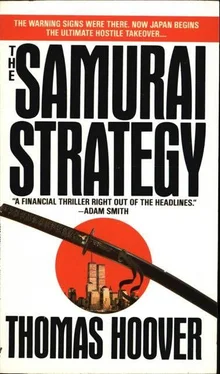Thomas Hoover - The samurai strategy
Здесь есть возможность читать онлайн «Thomas Hoover - The samurai strategy» весь текст электронной книги совершенно бесплатно (целиком полную версию без сокращений). В некоторых случаях можно слушать аудио, скачать через торрент в формате fb2 и присутствует краткое содержание. Жанр: Триллер, на английском языке. Описание произведения, (предисловие) а так же отзывы посетителей доступны на портале библиотеки ЛибКат.
- Название:The samurai strategy
- Автор:
- Жанр:
- Год:неизвестен
- ISBN:нет данных
- Рейтинг книги:5 / 5. Голосов: 1
-
Избранное:Добавить в избранное
- Отзывы:
-
Ваша оценка:
- 100
- 1
- 2
- 3
- 4
- 5
The samurai strategy: краткое содержание, описание и аннотация
Предлагаем к чтению аннотацию, описание, краткое содержание или предисловие (зависит от того, что написал сам автор книги «The samurai strategy»). Если вы не нашли необходимую информацию о книге — напишите в комментариях, мы постараемся отыскать её.
The samurai strategy — читать онлайн бесплатно полную книгу (весь текст) целиком
Ниже представлен текст книги, разбитый по страницам. Система сохранения места последней прочитанной страницы, позволяет с удобством читать онлайн бесплатно книгу «The samurai strategy», без необходимости каждый раз заново искать на чём Вы остановились. Поставьте закладку, и сможете в любой момент перейти на страницу, на которой закончили чтение.
Интервал:
Закладка:
After he reached the pinnacle, he held the job for a mere five years, then routinely left. He had to go; early fifties and you're out. MITI is no country for old men. He moved on to head the Japan Development Bank, JDB, where he financed various high-tech start-up industries. Finally he retired and went out on his own.
Unlike most other retired government officials, however, he didn't accept any of the lucrative private offers he received, the suddenly "vacant" spot on a conglomerate's board of directors. No, he had his own smoldering vision. In a dazzling and successful departure from usual Japanese convention, he founded Nippon, Inc., an adjunct to Japan's major financial players, with headquarters in the commercial center of Kyoto. His new organization immediately became a financial fixture in the new postindustrial, high-tech Japan, and now, five years later, Nippon, Inc. was a thriving force in the management of capital. These days even the new generation at MITI routinely called him up for "consensus."
For Matsuo Noda now, everything was in place; he was at last ready to pursue a lifelong dream. He'd never forgotten the end of the war, that last day on Okinawa when Ushijima's 32nd Army was a dazed remnant. He'd been in the cave above Mabuni when the general radioed his farewell to Imperial Headquarters, then severed his own spinal cord. Matsuo Noda, with anguish he could still remember, had burned the regimental flag and told those remaining to scatter, to become guerrillas-repeating Ushijima's last command to "fight to the last for the eternal cause of loyalty to the emperor." Noda had declared that their struggle would continue on for a hundred years if need be.
He had overestimated the difficulty. The plan now poised had required less than fifty.
As usual for a work-at-home Saturday (just another business day in Japan), he was wrapping up loose ends from the week, finishing reports, signing off on audits. Two printers were running, since he preferred to work with hard copy, and he was reviewing the list of outstanding loans NI was in charge of monitoring, checking for any early signs of trouble. Had any credit ratings slipped? If a receiving corporation was publicly traded, had its stock faltered? What was the overview: securities, un-amortized discounts on bonds, cash on hand? Next he paged through the weekly updates from the Small Business Finance Corp., the National Finance Corp., the Shoko Chukin Bank, various credit associations and savings banks. It was all on his Kyoto information base, pulled off the new fiber-optic network that linked Japan's financial centers.
He was about to ring down for fresh tea when a priority override flashed on the screen for his eyes only. This meant a coded message that could only be unscrambled using a special module in the computer. The Kyoto office knew he was on line, but they hadn't wanted to route the information directly.
Highly irregular.
He punched in the code, called up the receiving routine, and waited for the message.
There had been a call from ship-to-shore phone, the communications line linking him directly with Dr. Shozo Takahashi, director-in-charge of his top secret "project" in the Inland Sea. The director was requesting that Noda-sama contact him immediately via scrambler. Top security. He felt his pulse begin to race as he digested the news.
It had been so easy. Almost too easy.
He sat perfectly still for that timeless, historic moment, gazing at the photograph of Akira Mori. A promise kept, from long, long ago. Four decades now, and he had never forgotten what he had said he would do for her.
He called down for tea, waited till it had been delivered, then punched on the phone and switched it to the security mode.
But even on the scrambler, Takahashi began circumspectly. As the esteemed Noda-sama was aware, their "project" had, over its three years, contended with great difficulties and many disappointments. They were working at the very limits of undersea technology. As Noda-sama also knew, he went on, their early attempts at seismic vertical profiling had been a complete failure. Takahashi took personal responsibility for that. Next they had changed strategy and utilized state-of-the-art microwave radar, hoping that minuscule changes in density along the bottom might indicate what they sought. That too, Takahashi apologized, had been unproductive from the start as Noda-sama had been informed, and he, Takahashi, took full blame for the failure.
Noda cut in at that point, impatient and wanting to circumvent the litany of apologies. Why was Takahashi calling?
The director paused dramatically, then declared he wished to inform the august Noda-sama that their latest approach, the use of a new digital magnetometer, had at last borne fruit. Only this morning they had detected and brought up an "item." In the treacherous straits east-northeast of Shikoku. It was a water-tight gold case embossed with what appeared to be a sixteen-leaf chrysanthemum or kiku. The imperial insignia.
Other confirming inscriptions? Noda nervously reached out and clicked off the humming computer.
Yes, the formal script across one end appeared to be no later than tenth century. Although they dared not open the gold case for fear of damaging its contents, at this moment preliminary analytical procedures were underway and the early results, including a makeshift attempt at shipboard X-ray crystallography, suggested that the steel inside, which clearly showed traces of copper alloy, contained less than a hundredth of one percent of iron oxide. In short, it was possible the "item" might be perfectly preserved.
It was theirs, Takahashi said, in that breathy, clipped language inferiors use to signify great importance and great deference. It was his extreme honor to announce to the esteemed Noda-sama that the most important archeological find in the history of Japan now belonged to Nippon, Inc., and they-
"Chigau," Noda cut him off, in the curt tone expected of superiors. Incorrect: it belonged to its rightful owner and would now be returned.
And furthermore, he added, Nippon, Inc. had just ceased to exist. Since the name for ancient Japan was Dai Nippon, "Great Japan," as of this moment Nippon, Inc. had just become Dai Nippon, International. A complete reorganization would begin immediately.
Finally he ordered a total blackout. Radios silenced. No shore leave for crew or scientists.
He clicked off the phone and repressing a tremble, descended the stairs.
And there on the garden veranda, using a new brush and perfumed sumi ink from his rare collection, Matsuo Noda composed a very elaborate letter, long swirls of black down a perfect sheet of thick, flowered paper hundreds of years old. It was then sealed in a silver case and hand delivered by special messenger to a fortress in, the center of Tokyo.
Five days later its recipient read it before a nationally televised press conference, and Japan exploded.
CHAPTER FIVE
"Kami wo araitai no desu ga. Ii desu ka?" Tam peered through the doorway and nodded hello to the girl in the blue Imperial Hotel uniform. The hair salon was almost empty. Perfect.
"Hai, so." The girl, startled at the gaijin's accentless Japanese, bowed to the waist. "Dozo."
"Manikyua mo onegai shimasu." What the heck, Tam thought, why not go all the way, get a manicure too.
"Hai. Dozo." Another bob as the girl ushered her forward.
There was the plush, padded chair. Big, gray, and voluptuous. She sighed and settled back. Heaven. Perfect peace in the middle of hectic Tokyo. She knew that here for an hour or so she would be an honored guest, smothered with attention. One of the most incredible experiences in Japan.
While three of the girls began shampooing her hair, they went back to chattering about the new husband a matchmaker had just arranged for the petite assistant in the back. The bride-to-be was blushing and there were plenty of giggles all around, hands over mouths. Tam realized, though, that the girls were being a little circumspect. Who was this strange brunette gaijin, speaking Japanese with no accent. Maybe she understood what they were saying.
Читать дальшеИнтервал:
Закладка:
Похожие книги на «The samurai strategy»
Представляем Вашему вниманию похожие книги на «The samurai strategy» списком для выбора. Мы отобрали схожую по названию и смыслу литературу в надежде предоставить читателям больше вариантов отыскать новые, интересные, ещё непрочитанные произведения.
Обсуждение, отзывы о книге «The samurai strategy» и просто собственные мнения читателей. Оставьте ваши комментарии, напишите, что Вы думаете о произведении, его смысле или главных героях. Укажите что конкретно понравилось, а что нет, и почему Вы так считаете.












